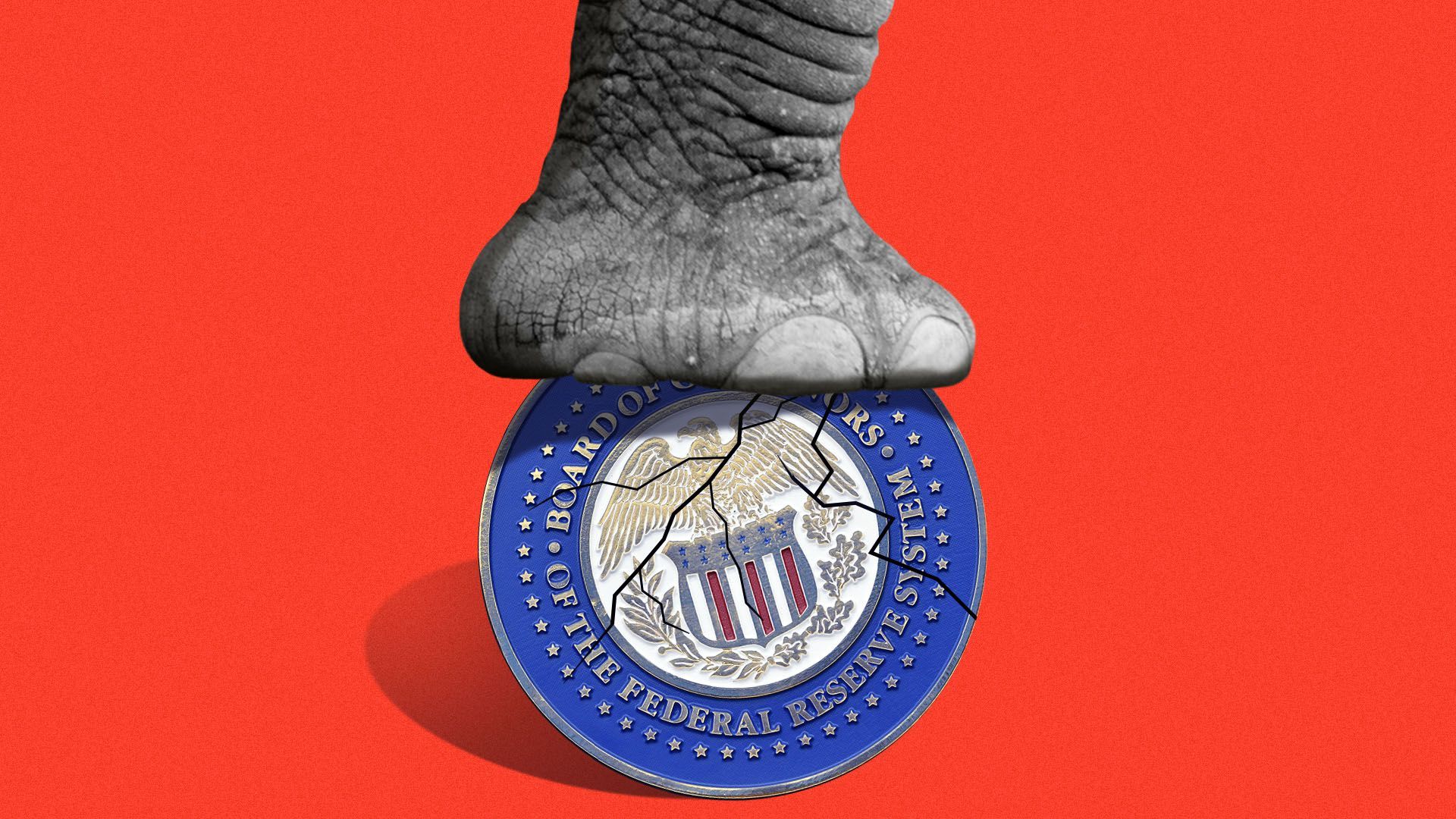| | | | | | | Presented By Northern Trust | | | | Axios Markets | | By Dion Rabouin ·Dec 21, 2020 | | 😭 Farewell, for now! This is my final newsletter of the year. I'll be back in your inboxes Jan. 4. Until then, Happy Kwanzaa to each and every one of you. If you need a fix before January find me on Twitter @DionRabouin. - My boss, managing editor Aja Whitaker-Moore, will be handling Markets for the next two days before our Christmas break. Please read it and say nice things to her!
Situational awareness: A new coronavirus strain is "out of control" in parts of England and markets throughout Europe and futures prices in the U.S. are down significantly on the news. (Bloomberg) - Was this email forwarded to you? Sign up here. (Today's Smart Brevity count: 1,177 words, 4 minutes.)
🎙 "Nothing in life is to be feared, it is only to be understood. Now is the time to understand more, so that we may fear less." | | | | | | 1 big thing: The world's dual realities could harden in 2021 |  | | | Illustration: Sarah Grillo/Axios | | | | Heading into 2021, the economy is in a state of gross divergence, presenting opposing narratives that are drifting further apart, creating ostensible winners' and losers' brackets. Why it matters: The pandemic has accelerated shifts in the economic makeup of the U.S. and the world and those trends are being further cemented. The economy and stock market are diverging: - The Nasdaq's 42% rise year to date in the face of a U.S. economy expected to contract by 3% is perhaps the most jarring example yet but economic growth has been softening for years as equity prices — especially for big tech companies — have boomed.
- Since the global financial crisis in 2008, U.S. GDP has averaged 2% growth, while the Nasdaq has averaged an 18.1% gain, not including 2020.
- From the Nasdaq's inception until 2009, the index averaged a 10.6% annual gain while the U.S. economy had grown by an average of 3.1%.
Credit markets are diverging: - For large public companies with access to debt markets, credit is cheap and widely available. The ICE Bank of America investment-grade corporate bond index shows that yield spreads have returned to the historic lows seen before the coronavirus pandemic upended markets in March.
- Credit from banks to smaller businesses and individuals, however, remains historically elusive and expensive. The percentage of domestic banks tightening standards on consumer loans and credit cards, and the percentage tightening standards for commercial and industrial loans are both at their highest levels since 2009 (excluding levels seen earlier this year in Q2 and Q3).
The fortunes of the young and old are diverging: - Higher housing costs mean more equity and higher resale values for homeowners, but also mean higher rent. Similarly, advances in health care mean older people are living longer and able to accrue the benefits of rising asset prices rather than passing them on to the next generation.
- That directly benefits older Americans largely at the expense of younger ones, who are moving out of large metros like New York and LA on the coasts and toward places like Phoenix and Denver that still offer vibrant cultural life but lower rent prices.
- The median age of all U.S. homebuyers has risen from 31 in 1981 to 47 in 2019.
- The slow recovery in the labor market and real economy also is impacting childbirths, researchers at Brookings say.
- They estimated in June that the U.S. would see 300,000-500,000 fewer births this year. They noted in an update last week that the declining availability of child care and school closures could be worsening the expected 2020 "baby bust."
|     | | | | | | Bonus chart: Credit market divergence |  Data: ICE Data Indices via FRED, Board of Governors of the Federal Reserve via FRED; Chart: Axios Visuals Loan growth at U.S. banks has been declining over the past three quarters, as banks have tightened their lending standards for consumers and small businesses, the Fed's latest survey of senior loan officers shows. On the other side: U.S. companies had issued nearly $5.1 trillion of corporate bonds and loans, including riskier leveraged loans, through Nov. 26, according to a WSJ report citing Refinitiv data. - Companies' cash holdings rose to a record $2.1 trillion at the end of June, according to a report from Moody's, up 30% from the same time last year and higher than the previous peak of nearly $2 trillion in 2017.
The big picture: The growing role of central banks to sustain the economy has meant that financial markets have been the major beneficiaries of radically increased liquidity. - Little of that has trickled down to average consumers and small businesses seeking help from banks that largely have been uninterested in providing financing to smaller borrowers in uncertain times.
|     | | | | | | 2. Catch up quick | | Senate Majority Leader Mitch McConnell said "the four leaders of the Senate and the House finalized an agreement" on a coronavirus relief package Sunday. (The Hill) SoftBank will file to raise between $500 million and $600 million in an IPO today of its first SPAC and is said to be prepping at least two additional SPACs. (Axios) The FDA approved Moderna's vaccine for emergency use. First doses were shipped Sunday with immunizations expected to begin Monday (WSJ) |     | | | | | | A message from Northern Trust | | The wealth planning trifecta | | |  | | | | The trifecta of low interest rates, high exemption amounts and uncertain tax policy future make it a good time to revisit your wealth plan to prepare for an uncertain future. Learn how to take advantage of this window of opportunity from Northern Trust's The Wealth Planning Trifecta report. | | | | | | 3. Republicans take aim at the Fed |  | | | Illustration: Sarah Grillo/Axios | | | | Republicans began their latest attack on the Fed over the weekend, seeking to rein in the central bank's ability to recreate the slate of lending programs it rolled out after announcing QE4ever in March. What happened: Sen. Patrick Toomey (R-Pa.) and a group of fellow Republican senators had proposed curbing the central bank's lending powers to prevent new programs from being created that provide direct lending to large and medium-sized companies and the purchase of bonds from corporations and municipalities with just approval from the Treasury. - "It could potentially be used as a back door to do state, local aid, which I think is the idea, without Congress' approval," Sen. John Cornyn (R-Texas) told reporters on Friday.
- South Dakota Sen. John Thune echoed those statements, saying the Fed's current authority to provide funding "exists beyond the temporary period which could be leveraged to create a lot more authority and spending."
Where it stands: While the final coronavirus relief bill agreed to by Congress reportedly includes a compromise on the Fed's capabilities, don't expect this to be the end of it. Flashback: In his 2015 book "The Courage to Act" former Fed chair Ben Bernanke recalled how he was grilled by Congress over the Fed's QE programs that propped up banks during the financial crisis. The actions buoyed the banking sector and the economy but eventually led to significant growth in wealth and income inequality. - "[T]he increasing hostility of the Republicans to the Fed and to me personally troubled me, particularly since I had been appointed by a Republican president who had supported our actions during the crisis," Bernanke wrote.
- "[I]t seemed to me that the crisis had helped to radicalize large parts of the Republican Party,"
The big picture: Chair Jerome Powell and the Fed are likely to face similar hostility next year, and it could be much worse. - Powell's Fed took substantially greater action — going so far as to use taxpayer funds to backstop bond purchases from megacorporations like Apple and Verizon as well as those of junk-rated companies, including some in the contentious oil and gas sector.
- The Fed's popularity is lower than it was coming out of the global financial crisis, with the latest Axios/Ipsos poll finding 42% of Americans have at least some trust in the Fed, while 56% have not very much trust or none at all.
- (Those numbers were up notably from earlier in the year when only around 35% of Americans said they trusted the central bank.)
- Economic inequality is now far greater than it was at the beginning of the year — and it was at record levels then.
|     | | | | | | 4. Scoop: FuboTV considering exclusive sports content deals | | Screenshot of a video interview between Dion Rabouin and David Gandler, CEO of FuboTV Upstart streaming network fuboTV "should be looking at" forming exclusive partnership deals for live sports offerings, CEO David Gandler tells me. Why it matters: The company is small but growing fast — its stock price has jumped 340% year to date, including a 19% gain on Thursday and 11% gain on Friday that pushed its fully diluted market cap to more than $5.7 billion, per FactSet — and could pull sports-dedicated streaming companies like DAZN and ESPN+ toward further content siloing. What we're hearing: "I don't think it's unreasonable for us to think about that going forward," Gandler told me on the Voices of Wall Street podcast when I asked him about exclusives. So, that means yes, right? - "Everything is always on the table."
|     | | | | | | A message from Northern Trust | | How to relocate with taxes in mind | | |  | | | | Relocation is top-of-mind for many people this year because of potential tax savings and remote working becoming the norm. But before relocating, consider the broader impact of the move and understand the requirements to establish residency. The tax factors to consider. | | | | Thanks for reading! Quote: "Nothing in life is to be feared, it is only to be understood. Now is the time to understand more, so that we may fear less." Why it matters: On Dec. 21, 1898, French scientists Pierre and Marie Curie discover the chemical element radium. - Marie Curie, to whom the quote is credited, was the first woman to win the Nobel Prize in 1903 for her work in physics and in 1911 became the first person to win the Nobel Prize in two different scientific fields, winning for her work in chemistry.
- Her daughter Irène Joliot-Curie, also went on to win a Nobel Prize in chemistry.
| | | | Axios thanks our partners for supporting our newsletters.
Sponsorship has no influence on editorial content. Axios, 3100 Clarendon Blvd, Suite 1300, Arlington VA 22201 | | | You received this email because you signed up for newsletters from Axios.
Change your preferences or unsubscribe here. | | | Was this email forwarded to you?
Sign up now to get Axios in your inbox. | | | | Follow Axios on social media:    | | | | | |








No comments:
Post a Comment